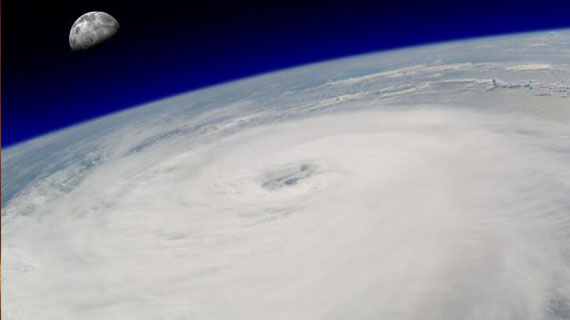[vc_row][vc_column][vc_column_text]Last month, Hurricane Irma came crashing in with some of the strongest winds ever seen in an Atlantic hurricane, and maintaining category 5 intensity longer than any storm previous. It generated more power than the 8 named storms of the Atlantic hurricane season (Arlene-Harvey) that came before (including Hurricane Harvey), prompting seven million people to evacuate. It left about 5.6 million Florida residents, two-thirds of the state’s homes, were without power. The storm is responsible for at least 68 deaths in the Caribbean and the Southeast. It has been three weeks since the catastrophic storm, but many areas are still in ruins, and some people are still missing.
Reading statistics like this can make God seem distant and harsh. How could He allow such devastation? What good could possibly come from a parent losing their child, a child losing their parent, homes being destroyed, lives being uprooted, worlds being turned upside down?
Reflecting on all of this reminds me of Steve Saint’s story. Many of you are familiar with it, or rather the story of Jim Elliot. Steve’s father, Nate, was one of the five missionaries, including Jim Elliot, who were killed trying to evangelize the Huaorani people through efforts known as “Operation Auca. You may have seen the movie, End of the Spear, which told their story. Steve was only five years old when his father was brutally murdered by the Huaorani tribe. Nate, Jim, and their three friends knew that the Huaorani people were killing the employees of an oil company that was moving in on their land, but they didn’t know that the tribe habitually killed their own members. In fact, anthropologists have never studied a tribe with a higher homicide rate than the Huaorani, and more than 60% of the tribe’s members were speared to death or killed with machetes by their own people. In short, this was an extremely violent and deadly group of people that Nate and the crew were trying to reach for Jesus. After what seemed to be a promising start to their mission, all five missionaries were brutally speared and murdered with machetes then thrown in to the river to be eaten. Five-year-old Steve was left with confusion, heartbreak, and doubt when his mother told him that his father wasn’t returning home.
But Steve’s story doesn’t stop there. Years later, after three sons, his wife gave birth to a little girl. When she went away to college, a group called Youth for Christ asked her to travel around the world with them for a year and share the Gospel. Steve did not want her to go; he wanted her home with him. Nonetheless, she left, and the painful year of separation for Steve came and went. The day they picked her up from the Orlando airport was a joyous one, and they headed home for her welcome home party. During the party, she retired to her bedroom with a headache. Steve and his wife left everyone else celebrating their daughter’s return and went to be with her in her room. As Steve was holding her in his arms and praying for her aloud, she had a massive cerebral hemorrhage. When they got to the hospital, the doctors told Steve and his wife that there was no hope for recovery for their only daughter, their baby girl.
Steve has had a hard life. I don’t think anyone would deny that after hearing his story. However, he has one of the most radically challenging views on suffering that I have ever encountered. He says,
“If we are going to emulate our Savior, we have to identify with the people to whom we take his good news. I don’t advocate that we look for suffering; life brings enough of it on its own. But what I do advocate is that suffering is an important prerequisite to ministering to hurting people. Christ took on our likeness and subjected himself to the suffering that plagues us. I am convinced that we should not make heroic efforts and expend vast resources like the rest of our society does to avoid suffering. Not only would a willingness to experience hurt give us credibility with suffering people, but it would also give God a special opportunity to prove his sufficiency to meet our needs. As [C.S. Lewis] said, ‘God whispers to us in our pleasures, speaks in our conscience, but shouts in our pains: It is his megaphone to rouse a deaf world.’
I like the way Steve says it above, but he is simply reiterating James 1:2-4, which says, “Consider it pure joy, my brothers and sisters, whenever you face trials of many kinds, because you know that the testing of your faith produces perseverance. Let perseverance finish its work so that you may be mature and complete, not lacking anything. Our human nature hates any kind of suffering because it is uncomfortable. Of course, we would rather our loved ones and ourselves be safe, happy, and thriving. The reality is, however, that many of us tuck God away when things are going well in our lives. We feel like we have things under control, so we don’t think we need Him as much…until things get bad, and then we run back to Him. James says that trails should make us joyous! They draw us close to God and make us more like Him. That is a good thing, not something we should avoid at all costs like we tend to do!
Steve poses a great question: “Why is it that we want every chapter to be good when God promises only that in the last chapter He will make all the other chapters make sense, and He doesn’t promise we’ll see that last chapter here? When the literal and metaphorical hurricanes come crashing into our lives, we must remind ourselves that we don’t have the whole picture, but God does. It may not make sense to us now, but we can trust that He is using our trials to sanctify us because He loves us. This doesn’t negate the pain of our sufferings and losses, but it does give purpose to them. Not only do we gain the privilege of growing closer to and more like God in a way that we wouldn’t be able to if we had not experienced our pain, but we also discover the ability to empathize with other hurting individuals and show them the love of Christ in a new way. We can understand their hurt, and we know Who to point them to. Hold on to His assured hope and embrace your ability to love others in a new way![/vc_column_text][/vc_column][/vc_row]
Reading statistics like this can make God seem distant and harsh. How could He allow such devastation? What good could possibly come from a parent losing their child, a child losing their parent, homes being destroyed, lives being uprooted, worlds being turned upside down?
Reflecting on all of this reminds me of Steve Saint’s story. Many of you are familiar with it, or rather the story of Jim Elliot. Steve’s father, Nate, was one of the five missionaries, including Jim Elliot, who were killed trying to evangelize the Huaorani people through efforts known as “Operation Auca. You may have seen the movie, End of the Spear, which told their story. Steve was only five years old when his father was brutally murdered by the Huaorani tribe. Nate, Jim, and their three friends knew that the Huaorani people were killing the employees of an oil company that was moving in on their land, but they didn’t know that the tribe habitually killed their own members. In fact, anthropologists have never studied a tribe with a higher homicide rate than the Huaorani, and more than 60% of the tribe’s members were speared to death or killed with machetes by their own people. In short, this was an extremely violent and deadly group of people that Nate and the crew were trying to reach for Jesus. After what seemed to be a promising start to their mission, all five missionaries were brutally speared and murdered with machetes then thrown in to the river to be eaten. Five-year-old Steve was left with confusion, heartbreak, and doubt when his mother told him that his father wasn’t returning home.
But Steve’s story doesn’t stop there. Years later, after three sons, his wife gave birth to a little girl. When she went away to college, a group called Youth for Christ asked her to travel around the world with them for a year and share the Gospel. Steve did not want her to go; he wanted her home with him. Nonetheless, she left, and the painful year of separation for Steve came and went. The day they picked her up from the Orlando airport was a joyous one, and they headed home for her welcome home party. During the party, she retired to her bedroom with a headache. Steve and his wife left everyone else celebrating their daughter’s return and went to be with her in her room. As Steve was holding her in his arms and praying for her aloud, she had a massive cerebral hemorrhage. When they got to the hospital, the doctors told Steve and his wife that there was no hope for recovery for their only daughter, their baby girl.
Steve has had a hard life. I don’t think anyone would deny that after hearing his story. However, he has one of the most radically challenging views on suffering that I have ever encountered. He says,
“If we are going to emulate our Savior, we have to identify with the people to whom we take his good news. I don’t advocate that we look for suffering; life brings enough of it on its own. But what I do advocate is that suffering is an important prerequisite to ministering to hurting people. Christ took on our likeness and subjected himself to the suffering that plagues us. I am convinced that we should not make heroic efforts and expend vast resources like the rest of our society does to avoid suffering. Not only would a willingness to experience hurt give us credibility with suffering people, but it would also give God a special opportunity to prove his sufficiency to meet our needs. As [C.S. Lewis] said, ‘God whispers to us in our pleasures, speaks in our conscience, but shouts in our pains: It is his megaphone to rouse a deaf world.’
I like the way Steve says it above, but he is simply reiterating James 1:2-4, which says, “Consider it pure joy, my brothers and sisters, whenever you face trials of many kinds, because you know that the testing of your faith produces perseverance. Let perseverance finish its work so that you may be mature and complete, not lacking anything. Our human nature hates any kind of suffering because it is uncomfortable. Of course, we would rather our loved ones and ourselves be safe, happy, and thriving. The reality is, however, that many of us tuck God away when things are going well in our lives. We feel like we have things under control, so we don’t think we need Him as much…until things get bad, and then we run back to Him. James says that trails should make us joyous! They draw us close to God and make us more like Him. That is a good thing, not something we should avoid at all costs like we tend to do!
Steve poses a great question: “Why is it that we want every chapter to be good when God promises only that in the last chapter He will make all the other chapters make sense, and He doesn’t promise we’ll see that last chapter here? When the literal and metaphorical hurricanes come crashing into our lives, we must remind ourselves that we don’t have the whole picture, but God does. It may not make sense to us now, but we can trust that He is using our trials to sanctify us because He loves us. This doesn’t negate the pain of our sufferings and losses, but it does give purpose to them. Not only do we gain the privilege of growing closer to and more like God in a way that we wouldn’t be able to if we had not experienced our pain, but we also discover the ability to empathize with other hurting individuals and show them the love of Christ in a new way. We can understand their hurt, and we know Who to point them to. Hold on to His assured hope and embrace your ability to love others in a new way![/vc_column_text][/vc_column][/vc_row]
Stay Updated
Sign up for our monthly newsletter and weekly devotional











